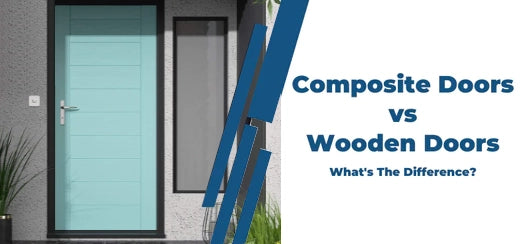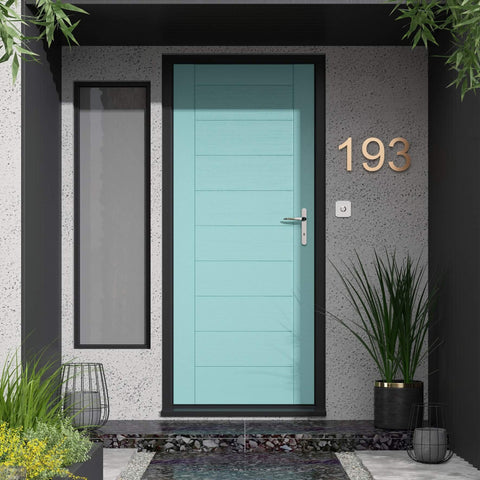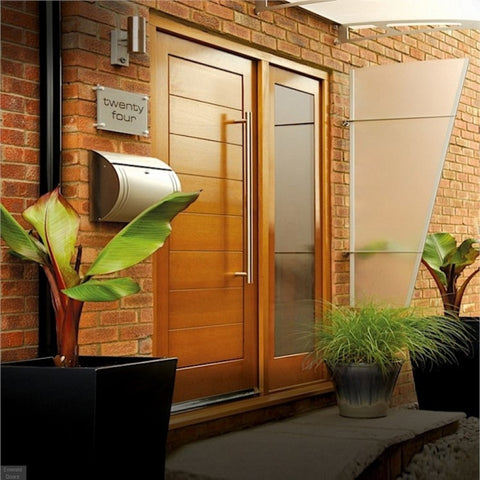
Composite Doors vs Wooden Doors: What's the Difference?
There are many types of doors that you can choose from for your home. Composite doors and wooden doors are two of the most popular door types to select from. But which one is right for you? Before jumping on to their differences, let us get an overview of what composite doors and wooden doors are.
What Are Composite Doors?

The term composite door usually refers to a wooden door that has been reinforced with a synthetic material, most commonly a plastic known as uPVC (unplasticized polyvinyl chloride). This combination of materials makes the door stronger and more durable than a standard wooden door. Composite doors are also available in a range of colours and finishes that add a touch of luxury to your home.
What Are Wooden Doors?

Wooden doors are doors that are made up of a single variety of wood or several pieces of the same species of wood. These doors come in a variety of shapes and sizes, the most popular being the standard rectangular shape. They are made from panels of wood that are either joined together or glued, and then fitted with a door handle and lock. Wooden doors can be painted or stained to match the décor of your home. These doors are commonly known as Timber doors.
Difference Between Composite Doors And Wooden Doors
Here is a look at the differences between composite doors and wooden doors so that you can make an informed decision.
-
Cost & Maintenance
Composite doors are typically more expensive than wooden doors, although this can vary depending on the materials and construction. However, composite doors require less maintenance than wooden doors, as they are resistant to weathering and rot. Wooden doors on the other hand require regular maintenance and care.
-
Materials
Composite doors are made up of a number of materials including wood, uPVC, metal, and glass. This makes them strong and durable and helps to keep the heat in or out, depending on your needs. Wooden doors are made of natural wood and require regular painting or staining to protect them from the weather.
-
Life Expectancy
Composite doors are made to last around 30 years, whereas wooden doors can last around 55-65 years. However, this is possible only if proper care is taken of the wooden doors. As composite doors are resistant to climate changes and decay, they tend to last longer in extreme weather conditions. Wooden doors will not last long in harsh outdoor environments.
-
Insulation
-
Security
Wooden doors are more susceptible to being broken into, as they can be easily chiselled or kicked in. External composite doors are much harder to break into, as they are made with thicker panels and are more reinforced. Additionally, wooden doors tend to warp and rot over time, making them less secure, while composite doors do not suffer from these issues.
-
Variety & Style
Composite doors are available in a much wider range of styles and colours than wooden doors, making it easier to find a door that will match the look of your home. Additionally, composite doors are often designed with more modern features and sleek lines, which can give your home a more contemporary feel. Whereas, wooden doors are typically available in a few standard styles and colours. However, wooden doors look classy and tend to give a rich and luxurious look to your home.
-
Weather
Composite doors are better suited for climates that have more extreme weather conditions, whereas wooden doors are better suited for climates with mild to moderate weather conditions. A composite door is more weather resistant than a wooden door and can handle harsh weather conditions. If you live in an area with severe weather conditions, such as high winds or heavy rains, a composite door is the best option.
Factors to Consider
It is wise to consider the following factors before making a purchasing decision.
-
Budget
-
Aesthetics
-
Durability
-
Safety
Needless to say, safety is the most important factor to consider when purchasing a new door. With the increasing number of thefts and robberies, keeping your family members and loved ones safe from intruders is necessary. Select the door that is strong and sturdy, and also provides utmost safety.
-
Efficiency
Doors that are energy efficient provide an extra layer of insulation and keeps you cool by reflecting the sun’s heat away during hotter months. However, energy efficient doors trap the heat inside during colder months. If you happen to live in intense weather conditions, opt for energy efficient doors.
Which Door to Buy?
The two types of door are vastly different in price, with a wooden door typically costing more than a composite door. A wooden door will also require more maintenance, as it needs to be stained and sealed every few years to protect it from the weather.
A composite door, on the other hand, only needs to be cleaned with a wet cloth occasionally. So, if you're looking for a low-maintenance option, a composite door is the best choice. However, if you prefer a more traditional look, a wooden door is the way to go.
Conclusion
When trying to decide between a composite door and a wooden door, it is important to consider all of the differences and factors mentioned in this article. Ensure that the door you select meets all your requirements as well as fits in your budget too. Emerald Doors offers a wide range of both composite doors and wooden doors to choose from.
FAQs on Wooden Doors vs Composite Doors
-
How long does a composite door last?
The average life expectancy of composite doors is around 30 years, almost three decades. As the composite doors are made up using a variety of materials, these doors are built to last and you wouldn’t have to worry about replacing them anytime soon.
-
Why are composite doors so expensive?
As the composite doors are constructed using a wide range of materials such as uPVC, metal, wood, and glass, these doors are expensive when compared to the other doors. Composite doors are known to take the best parts from other materials for their construction to make them robust.
-
Are wooden doors safe?
-
How long do interior wood doors last?
Wooden doors are known to last around 55 to 65 years on an average. This is possible only if the wooden door is taken proper care of. Regular dusting, painting, and maintenance contribute to the longevity of the wooden doors.